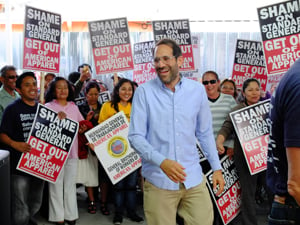
It’s a sign that the culture has changed at American Apparel Inc. when there’s more talk about action in the courtroom than there is about its limit-pushing ad campaign.
Last week was a particularly busy one for the beleaguered downtown L.A. clothing maker and retailer, as a series of cases involving the company, shareholders and some former employees came to resolution.
It proved to be a mixed bag for the company. American Apparel scored a victory when a federal judge refused to grant a request for a preliminary injunction filed by two shareholders, one of whom is a former employee. In another, a deal cut between a different shareholder and the clothing maker persuaded that shareholder to withdraw his intent to nominate candidates for election to the company’s board. In a third case, American Apparel was forced to pay out more than $4 million to employees after several lawsuits were resolved.
Victory
The hopes of two shareholders, one of whom is a former employee, to halt the company’s upcoming annual shareholders meeting and force a revote of last year’s slate of directors were scuttled last Monday when a federal judge denied their request for a preliminary injunction.
Jan Willem Hubner, whom court records identified as a former employee and supporter of American Apparel’s founder and ousted chief executive, Dov Charney, and Eric Ribner, Charney’s former college roommate, sued the company and certain board members in May, alleging the board vote was beset by fraudulent shareholder proxy statements.
U.S. District Court Judge Michael Fitzgerald of the Central District of California wrote in his order that the court was not convinced the shareholders would suffer great harm if the upcoming meeting goes on as planned, a requirement of granting a preliminary injunction. The meeting is scheduled for July 16.
Additionally, Fitzgerald wondered why, if the pair faced enough harm to warrant postponing the meeting, they waited until May to file the initial lawsuit.
“The Court takes seriously plaintiffs’ claims that they were disenfranchised by the proxy statements and have been denied a fundamental right as shareholders under Delaware law,” he wrote. But, he added, “the relief is at least 11 months delayed, holding the 2014 director elections again would involve substantial expense and disruption, and there are problems with potentially giving former shareholders lacking an economic interest in the company a say in the direction of the company.”
The judge also pointed out that none of the contested directors is up for election this year.
While not saying directly that an aim of the lawsuit was to help Charney void an agreement he signed with the company that he wouldn’t try to serve as director of the company, Fitzgerald said he didn’t want to open the door to allow anyone to use the injunction to thwart the agreement and “carry out a corporate coup.”
Charney was suspended by the board immediately after last year’s annual meeting and officially fired in December. As part of a standstill agreement he signed in July 2014 with the company and its lenders, New York hedge fund Standard General, Charney cannot directly or indirectly seek the removal of any board member or instigate or help any third party in an attempt to do so.
Lose, draw
American Apparel recently avoided another potential challenge by agreeing to a middle ground with a minority shareholder.
Investor Jeffrey Kolb, who owns less than 5 percent of company shares, notified American Apparel he intended to nominate directors at next month’s annual shareholders’ meeting. He withdrew his slate after the retailer agreed to form an advisory committee made up of industry executives, employees and others to offer Chief Executive Paula Schneider insight and strategic input. The company also agreed to look for an independent director who is a retail and apparel industry veteran to fill a vacant seat on the board before the 2016 annual shareholders’ meeting.
Kolb said he wanted to name Gene Montesano, a co-founder of Lucky Brand jeans, and Adrian Kowalewski, American Apparel’s chief financial officer until 2011, as board candidates. Montesano may, if he chooses, head the advisory committee under the agreement. Montesano and Kowalewski have since withdrawn their names for consideration for seats on the board.
In an expensive end to another piece of litigation that came to light last week, American Apparel was required to pay out more than $4.5 million to plaintiffs and attorneys to resolve three lawsuits filed against it, Charney and members of the board in 2011.
The suits claimed sexual harassment, assault and battery, impersonation through the Internet, defamation and other related claims. The awards included attorney fees and other costs.
An American Apparel spokeswoman noted that the amounts were virtually entirely covered by insurance.
Keith Fink, who is representing Charney in a number of matters but not the ones associated with the payout, said that the outcomes are not judgments against Charney, who has never been found by any court or arbitrator to have committed sexual harassment.
“These cases were settled because the insurance company whose only goal is to save total dollars wanted to stop the legal bleeding on these cases,” he wrote in an email to the Business Journal.
